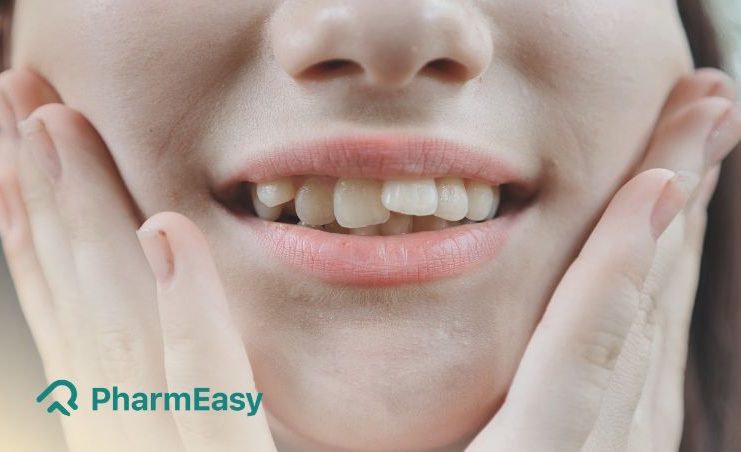8 Dangers Of Crooked Teeth: Explained!
By Dr. Nikita Toshi +2 more

Get,

to manage your symptom
Get your,


4 Cr+ families
benefitted

OTP sent to 9988776655



You’ve successfully subscribed to receive
doctor-approved tips on
Whatsapp

Get ready to feel your best.

Hi There,
Download the PharmEasy App now!!


Register to Avail the Offer
Send OTPBy continuing, you agree with our Privacy Policy and Terms and Conditions

Hi There,
Sign up on PharmEasy now!!
Trusted by 4 crore+ families

OTP sent to 9988776655



You have unlocked 25% off on medicines




Code: NU25
By Dr. Nikita Toshi +2 more
Table of Contents
Many people desire to have pearly white teeth and a beautiful smile. Some are also of the opinion that not having a great smile can negatively impact their career goals. Irrespective of people’s personal opinions, paying a regular visit to the local orthodontist is extremely vital for your dental and overall hygiene. Thus, we can say that undergoing orthodontic treatment is necessary for the following reasons:

The effects of treatments such as spacers, retainers or braces are long-lasting and will continue to benefit you for years to come. Correctly aligned teeth are easy to clean and maintain.
Once you have undergone orthodontic treatment, you will be able to reach the crevices of your teeth with your toothbrush and floss that you were not able to earlier and can effectively loosen any tartar buildup. Tartar accumulation along the gum line is bad for oral hygiene because it contains gum-damaging bacteria.
Misaligned jaw can make you susceptible to suffering from sleep apnea. This condition is caused by the obstruction of the airway when the person is asleep. The teeth keep the tongue in place, so when the jaw is misaligned, the tongue can fall backwards and impede breathing.
Living with crooked teeth can make a person feel self-conscious about themselves when they smile or talk in public. This can impede their overall productivity potential in life. Aside from this, there are some dangers to having crooked teeth. These are listed below:
The various types of orthodontic treatment options available are given below:
To rectify your crooked teeth(malocclusion) problem, your orthodontist can suggest you use orthodontic braces. Braces help to reduce teeth crookedness and correct malocclusion. Nowadays, patients have the option to choose between metal or ceramic braces (closer to the colour of teeth in appearance).
These are removable and hooked onto brackets to gently pull teeth into place. Elastics effectively correct underbites, overbites and slightly off single teeth.
This orthodontic device is attached to the teeth to increase the space required for a natural, functional bite. This is recommended for patients with smaller arches but larger teeth.
A headgear device can be customized to meet the patient’s needs, so it comes in multiple structures. A headgear is typically recommended for complex alignment cases and is often worn at night to quicken the treatment time. There are more such appliances that are used extra-orally to correct bony malocclusions.
These are transparent intraoral appliances which are meant to correct some types of mal-alignment.
As the name suggests, retainers hold the teeth in place to retain alignment. Retainers prevent the teeth from moving back to their original place. Usually prescribed in the maintenance phase after active treatment is completed.
Teeth straightening surgery is a procedure that is opted for by people when the crooked teeth issue cannot be corrected just with orthodontic appliances. Problems involving the bony structure of jaws usually require surgical correction.
To get the most out of your orthodontic treatment while at the same time minimizing discomfort, here are a few tips to follow:
From this blog, it is clear that crooked teeth can do more damage to your overall health than just become limited to a cosmetic concern. If you are suffering from dental issues due to malaligned teeth, schedule an appointment with your orthodontist and discuss the best possible treatment option for your condition.
Disclaimer: The information provided here is for educational/awareness purposes only and is not intended to be a substitute for medical treatment by a healthcare professional and should not be relied upon to diagnose or treat any medical condition. The reader should consult a registered medical practitioner to determine the appropriateness of the information and before consuming any medication. PharmEasy does not provide any guarantee or warranty (express or implied) regarding the accuracy, adequacy, completeness, legality, reliability or usefulness of the information; and disclaims any liability arising thereof.
Links and product recommendations in the information provided here are advertisements of third-party products available on the website. PharmEasy does not make any representation on the accuracy or suitability of such products/services. Advertisements do not influence the editorial decisions or content. The information in this blog is subject to change without notice. The authors and administrators reserve the right to modify, add, or remove content without notification. It is your responsibility to review this disclaimer regularly for any changes.

Leave your comment...
Comments